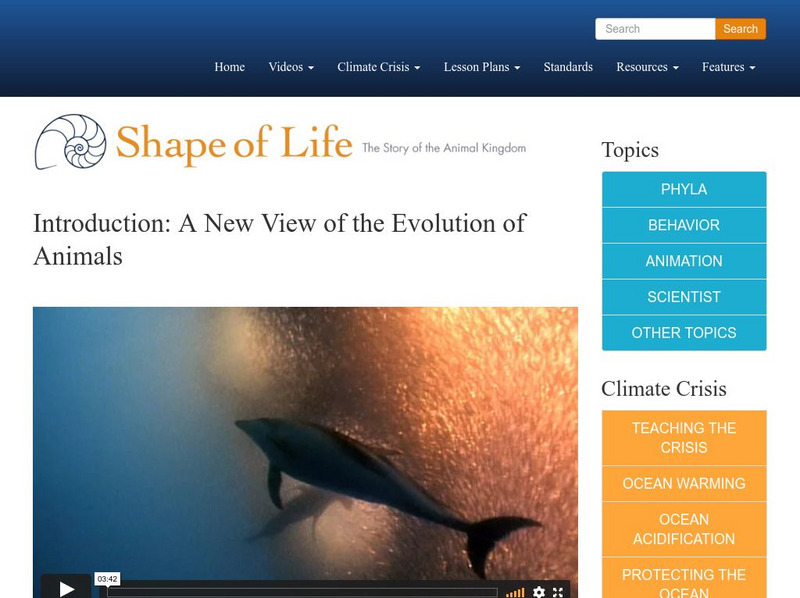Hi, what do you want to do?
SciShow
Big Breakthrough in Artificial Wombs | SciShow News
A new experimental design that can sustain mouse embryos outside the uterus means that soon, we may be able to watch mammalian embryo development in real time.
SciShow
How Do Brine Shrimp Survive In Packaging For Years?
Nearly everyone has some experience with the illustriously branded brine shrimp, but there’s a whole lot more to the creatures’ resilience than what it says on the box.
Crash Course
Animal Development: We're Just Tubes - Crash Course Biology
Hank discusses the process by which organisms grow and develop, maintaining that, in the end, we're all just tubes.
Curated Video
Evidence of Evolution
A video explaining how embryology, anatomy, and genetics can be used as evidence for evolution.
Visual Learning Systems
Classifying the Diversity of Living Things
In this video, we explore the challenging task of classifying the millions of different living things on our planet. By understanding classification principles and utilizing these tools, taxonomists contribute to our understanding of the...
Visual Learning Systems
Exploring Embryological Evidence of Evolution
In this exploration, we delve into the study of newly formed organisms and their development, known as embryology. Join us as we uncover the intriguing evidence of evolution that emerges from comparing the embryonic development of...
Curated Video
Embryo
This live-action video program is about embryos. The program is designed to reinforce and support a student's comprehension and retention of the term through use of video footage, photographs, diagrams and colorful, animated graphics and...
TED-Ed
How Turtle Shells Evolved... Twice
How do turtle shells form? Scholars explore the evolution of turtle shells and learn about how they form from many different bones before relating the process to cell differentiation in an organism. Pupils also look at different turtle...
Howard Hughes Medical Institute
X Inactivation
Have you ever wondered why calico cats have such a colorful coat? The process of X inactivation is an interesting phenomenon in females that drives the physical appearance of individuals. Viewers of an intriguing video connect knowledge...
Howard Hughes Medical Institute
Creating Embryonic Stem Cell Lines
Even today's stem cells have a history—and it's more than 30 years old! Learn how stem cell lines grow in a lab. Observe the various experiments completed to determine how cells grow in human embryos.
Howard Hughes Medical Institute
Human Embryonic Development
At what point in the fertilization process do stem cells turn into an embryo? Viewers observe the development of an embryo from egg to fertilization to development into a fetus. The narrator stresses the role of cell division,...
Howard Hughes Medical Institute
Differentiation and the Fate of Cells
Did you realize cells become restricted in the types of cells they produce as embryos develop? Stem cells might become anything, but late state cells can only become the specialized cell based on their locations. A captivating video does...
FuseSchool
What Are Stem Cells?
Almost every cell in the body has a special job. Part of the Fuse School Genetics playlist, the video discusses the few unspecialized cells, called stem cells. It explains where they are found, what they do, and why they raise ethical...
Bozeman Science
LS4A - Evidence of Common Ancestry and Diversity
Need help putting together an uncommonly good unit about common ancestry? Check out a video that covers NGSS standard LS4A, Evidence of Common Ancestry and Diversity. Topics include ways to convey similarities and differences between...
Teacher's Pet
Evidence for Evolution
Just over 1/3 of Americans reject evolution, insisting all living things have existed in their present form for all of time. The video offers multiple types of support for evolution. It discusses the evidence from fossils, anatomy,...
Deep Look
In the Race for Life, Which Human Embryos Make It?
Computers help doctors determine the most viable embryos. Researchers discovered the rate of embryo growth has a direct link to its sustainability. Pupils discover how doctors apply this research to help their patients.
Be Smart
Your Mom is LITERALLY Part of You!
You will always be on your mother's mind — literally, as it turns out. The video explains how cells pass between mother and child during pregnancy and how long these cells lasts. For up to 50 years after being born, you have cells from...
Be Smart
You Are An Upside-Down Lobster
Lobsters can regrow limbs, a trick humans can't do; however, according to this video, the placement of the spine and organs on the dorsal and ventral sides of a lobster is similar to the human body plan. The video also includes the...
University of North Carolina
The Goldstein Lab: Caenorhabditis Elegans Movies
This resource offers a series of film clips created by scientists studying this model organism. There are movies of embryos, larvae and adults and fascinating techniques. Great to supplement advanced study of cell biology and development.
Sea Studios Foundation
Shape of Life: Introduction: A New View of the Evolution of Animals
The scientific fields of paleontology, embryology, anatomy, and genetics have all contributed to a new view of the evolution of the animal kingdom. [3:42]
Khan Academy
Khan Academy: Early Embryogenesis Cleavage, Blastulation, Gastrulation, and Neurulation
This video [12:20] focuses on early embryogenesis, the creation of a fertilized egg and how the processes of Cleavage, Blastulation, Gastrulation, and Neurulation.
Best of Science
Best0f Science: What Can Embryos Tell Us About Evolution?
Learn how watching the development of an embryo reveals information about the evolution of different animals. [3:43]
CK-12 Foundation
Braingenie: Embryological Evidence for Evolution
[Free Registration/Login may be required to access all resource tools.] This video discusses the field of comparative embryology which helps scientists to identify evidence of evolutionary relationships between organisms. [2:07]





















